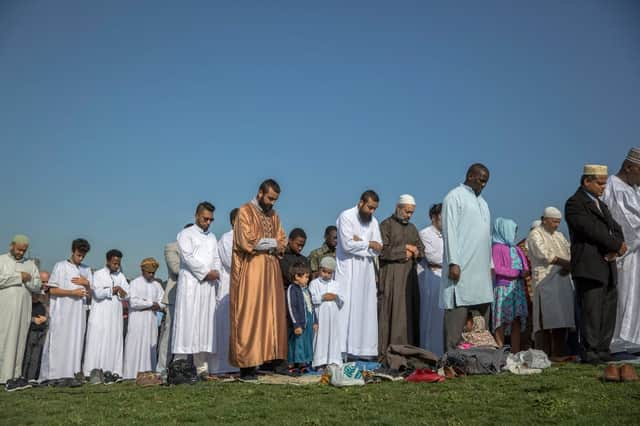Here's when Islam’s most important annual holiday, Eid ul-Adha, will be celebrated this year


Muslim communities across the UK are soon set to celebrate Eid ul-Adha, the most important of two main muslim holidays.
While its exact start date is not yet known, some astronomers have suggested it will arrive at the end of next month, on July 31.
Advertisement
Hide AdAdvertisement
Hide AdWith an estimated 2.8 million Muslims living in the United Kingdom, many people across the country are expected to take part in the Islamic celebrations.
However those of us who are not familiar with Islamic religious observances may be asking ourselves, what exactly is Eid ul-Adha? And how is it celebrated?
What is Eid ul-Adha?
The name of the holiday ‘Eid ul-Adha’ means ‘the celebration of the sacrifice’.
This name refers to a tale of sacrifice mentioned in the Quran, in which God asks the Prophet Ibrahim in a dream to sacrifice his son, Ismail, as a test of his faith.
Advertisement
Hide AdAdvertisement
Hide AdThose familiar with Christianity will notice parallels between this story and that of Abraham and his son Isaac found in the bible, called the ‘binding of Isaac’.
The Quaran explains that at first, Ibrahim ignored the dream, but after it had reoccurred for several nights in a row he decided to follow God’s orders to prove his faith.
As he tried to decide his course of action, muslim’s believe that the devil had tried to convince him not to kill his son.
In response, Ibrahim threw rocks at him. This is considered a significant act and one that is now copied by pilgrims at Hajj who throw stones at pillars.
Advertisement
Hide AdAdvertisement
Hide AdAs Ibrahim began to carry out God's command, God swapped his son for a goat, which Ibrahim was allowed to sacrifice instead.
Muslims around the world now celebrate this story by feasting on goat meat.
When is Eid ul-Adha celebrated in the UK?
In the Islamic calendar, celebrations for Eid ul-Adha begin on the 10th day of the 12th and final month.
This month is known as Dhu Al Hijjah or "The Month of the Pilgrimage".
Advertisement
Hide AdAdvertisement
Hide AdDepending on which date Dhu Al Hijjah begins, Eid ul-Adha will be celebrated in the Gregorian calendar on either Thursday, July 30, or Friday, July 31.
How is it celebrated in the UK?
Muslims in the UK usually start the celebrations by performing a full-body purification ritual known as ‘ghusl’, before attending a prayer service at a mosque.
One of the main rituals that occur on Eid ul-adha is the sacrificing of either a sheep, goat, or cow. However, under British law the animal must be killed in an official slaughterhouse.
The meat is then shared between family, friends, and the underprivileged, while some Muslims will also choose to donate money to charity or to poorer families.
Advertisement
Hide AdAdvertisement
Hide AdMosques sometimes arrange communal meals or hold lectures on aspects of Islam and Islamic history.
During the day Muslims will wish each other “Eid Mubarak”, a phrase which roughly translates to “have a blessed Eid”.
It is also customary to give gifts to children, as well as visiting relatives and even visiting funfairs with the family.
How might the celebrations be different this year?
Due to the coronavirus pandemic it is likely that some celebratory traditions will be reduced or changed a bit.
Advertisement
Hide AdAdvertisement
Hide AdSince lockdown laws have only permitted groups of up to six to gather, larger family gatherings would go against the government’s rules at the moment.
In May during Eid Al Fitr, known as the muslim festival of breaking the fast, authorities warned Islamic communities against both large gatherings, sharing food and giving gifts to children.
While places of worship are now open in the UK, they are only open for individual prayer and not for mass services.
However churches and mosques are allowed to hold usual services starting from the 4th July, meaning Eid prayers will be able to occur in mosques across the nation as long as appropriate social distancing measures are applied.